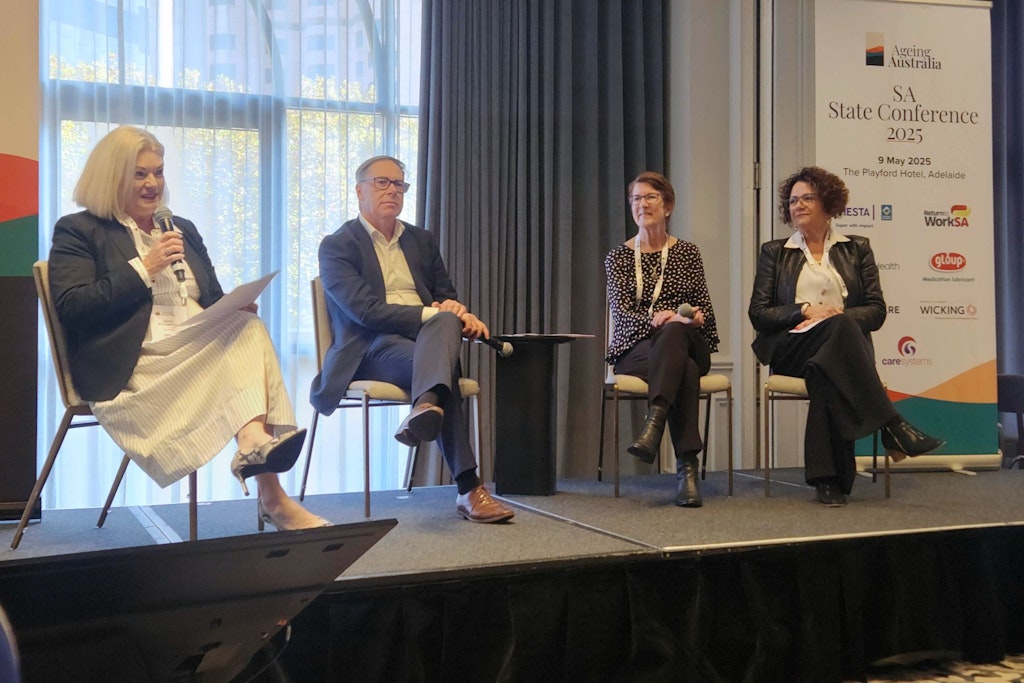The emotional toll: Supporting staff in a changing aged care landscape
Last updated on 27 May 2025

In the face of sweeping reforms, increasing community pressures, and a rising tide of psychological stress in the workforce, South Australian aged care leaders are highlighting the ways in which they have supported their workers.
At a recent panel discussion during Ageing Australia’s SA State Conference, aged care executives outlined the emotional, regulatory, and practical challenges confronting their staff. They also discussed the growing need for leadership that places psychological safety and organisational culture at the centre of care delivery.
Jane Pickering, CEO of Eldercare and board member at Ageing Australia, painted a sobering picture of the external pressures impacting aged care staff.
“We’re not only dealing with legislative changes, significant and ongoing reforms, financial pressures, and workforce challenges, but also everything else that’s going on around us [in society] does have a significant impact on communities, families, and individuals,” Ms Pickering said.
“Significant geopolitical challenges, war, community attitudes to immigration, climate change, increasing prevalence of mental health issues, domestic violence, housing instability and cost of living challenges.
“We cannot underestimate or ignore that these factors have an impact on our employees and on the culture of our organisations.”
Legislating a safe environment
A growing significance has been placed on understanding and addressing psychosocial hazards in workplaces, particularly in sectors like aged care where there is a greater risk of pressure, burnout or harm.
In recent years, laws have been introduced to regulate how psychosocial risks are managed and reduced, while some states like Victoria also recognise mental health injury claims as part of WorkCover.
Mardi Webber, Mentally Healthy Workplaces Consultant with ReturnToWorkSA, underscored the legislative shift that came into effect in South Australia in December 2023 as per national legislation. Under updated work health and safety laws, employers must actively manage psychosocial hazards — including stress, bullying, harassment, and emotional strain.
“Stress is normal, but when it’s excessive and ongoing, that’s when it can cause psychological or physical harm,” she explained.
“In the aged care sector, psychosocial hazards and risks may be high job demands, emotional demands, or if there’s poor support or control within the workplace over the work that we do. Poorly managed change is a huge one.
“Then it’s looking at behaviours in the workplace that can cause harm. Bullying and harassment, violence and aggression, sexual harassment. They’re not just seen in isolation, they can combine to cause greater harm.”
Ms Webber reinforced that this has been put in legislation because of the harm it can cause, and also the prevalence of psychosocial hazards in the broader healthcare and social assistance sector.
She emphasised that leadership commitment and staff consultation are essential.
“It’s not just about legislative responsibilities. It’s about creating that thriving workplace where people want to be at work and they want to stay because they do feel connected and included. Culture is critical,” she said.
Deliberate culture change
At a provider level, a deliberate cultural transformation has been key to strengthening the workplace for staff at Helping Hand. Its CEO, Chris Stewart, said a board-endorsed strategy around diversity, inclusion and belonging ensured that meaningful change occurred.
“These things don’t happen by accident. Culture is important but you have to put the frameworks in place to support that. We took a very deliberate approach,” he explained.
Helping Hand’s efforts saw it recognised by the Diversity Council of Australia as one of Australia’s most inclusive employers.
This success was underpinned by training at all levels, including executives, to ensure everyone knew how to support workers.
“What we were seeing was that a lot of people were leaving the organisation because they had performance issues, but when you unpack that, the conversations just weren’t happening early enough to make them feel included, that they could have a say, that they could express some of the challenges in their work,” Mr Stewart said.
“We’re early in the journey, but we’re happy with the shape that’s starting to take. Our board’s very strong on inclusion and making a very safe workplace.”
Signs of success include a notable reduction in turn over, reduced reliance on agency staff, and less hours lost to staff injury.

“If you have a deliberate strategy with targets and metrics, it drives behaviours. But at the end of the day, culture is absolutely 100% the most important thing,” he added.
Ms Pickering reinforced the benefits of fostering an inclusive and diverse workplace, stating that now is not the time for organisations or leaders to back away from diversity, equity and inclusion.
Unique challenges in remote care
The home care space delivers its own unique challenges as it is harder to pick up on subtle cues or witness exchanges that could involve bullying or harassment. Many workers can also feel more isolated simply because there are fewer in-person check-ins.
Anna Howard, CEO of Murray Mallee Aged Care Group, cited these exact problems while talking about the ‘tyranny of distance’. She said open and effective communication channels are essential so that staff know they always have dedicated support and can get in contact with someone as soon as a problem arises.
“We also invest heavily in training. We’re very happy to spend any amount of money that’s necessary to provide the training to support staff. We’re well aware of the pressure changes happening and information is absolutely critical in times of change,” Ms Howard said
“I have encouraged all the leaders to attend as many information workshops as possible. We use all of those forums to inform ourselves, and this in turn enables the team to deal with any issues or unexpected questions from clients.”
Ms Howard added that she has received ongoing support from an external organisation called Leading Teams, alongside a human resources consultant, to ensure they have independent consultants offering tailored advice.
This has helped Murray Mallee develop its workplace culture to reduce the risk of psychosocial harm on staff.
“We hold ourselves accountable to being kind, genuine, reliable and engaging. Always keeping the best interests of the organisation and the greater good at heart,” she added.
Don’t forget yourself in the journey forward
As aged care continues to evolve under reform and regulation, leaders across the sector agree: supporting staff well-being is no longer optional. It’s fundamental. However, it is also essential to support your own well-being as a leader.
Mr Stewart said it is easy as a leader to forget about looking after yourself, but it must be a priority.
“About six years ago we had a terrible incident. As a leader you’re busy managing the crisis and looking after everyone else, managing the Commission and the media. You forget to look after yourself and that catches up with you eventually,” he said.
“These are demanding, emotionally draining jobs. You have to look after yourselves and make sure your mental health and physical health are in good shape, otherwise it’ll come back later [as a problem].”